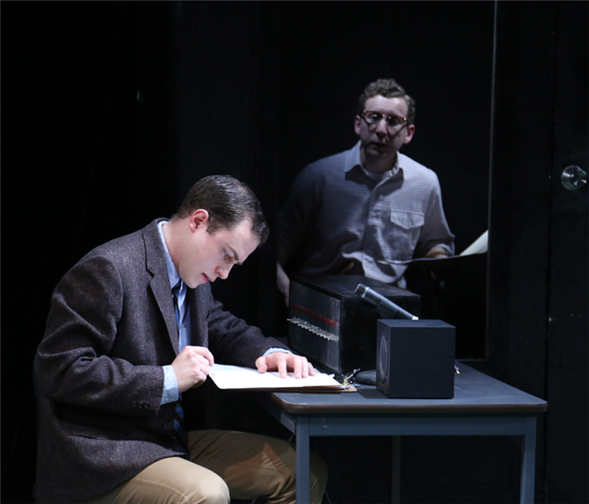Translate Page

A new play tackles the legacy of a scandalous experiment
---
In social psychologist Stanley Milgram's obedience experiments in the early 1960s, a number of Yale College students were told they would be helping researchers try out a new method of teaching. The method involved punishing a test-taker's incorrect answers with a series of electric shocks that increased in voltage with every mistake. In actuality, the shocks were fake, and the student screaming in the other room was only performing his pain. The subjects were in fact being used to investigate how long and under what conditions they would override their own moral discomfort in order to obey someone else's instructions.
"You can question the methodology," says William Carden, the director of Ensemble Studio Theatre's current production, Please Continue. "No one would ever do that experiment today. But his experiments showed us something."
Please Continue helps us understand what that "something" might be.
Carden has been developing the show with playwright Frank Basloe for almost five years, and in that time it has undergone significant changes. In an earlier version, two main stories – about the Milgram experiments and about an infamous sex scandal that took place at Yale's Calhoun College around the same time – were separated into separate acts. Meanwhile, William Sloane Coffin, the noted civil rights advocate and anti-war activist who served as Yale's chaplain throughout the 1960s, was woven throughout. "The structure didn't work," Carden recalls. "But the stories were fascinating."
Finally, he and Basloe decided they didn't have to separate the scandals, even if they didn't happen simultaneously. By collapsing time and overlapping the stories, they were able to illuminate the philosophical and moral questions raised by both.
The play's approach is also informed by On the Cusp, Daniel Horowitz's recent book about Yale in the 1960s. Carden was especially inspired by Horowitz's suggestion of a three-class system of Yale students at this time – quintessential "Yale men" (the most privileged insiders), "outsiders" (often Jewish or from the Midwest), and "rebels" (those who resisted the expectations of the elite university environment).
Carden says, "The circumstances driving the characters of Please Continue really come out of how they fit into that world and what pressures were on them." No characters are fully blameless for their actions, but none of them are simply culpable, either.
Ultimately, the play is not about judging the students or Milgram, who Carden notes "had an infinitely curious mind." The show's questions about obedience, punishment, forgiveness, and complicity are much more complex. Each one of the four main characters has done something we might find questionable, but perhaps any one of us might have done the same.
For Carden, the primary issue becomes less the actions that have been committed than the question of how to atone for them.
"Atonement is recognizing the truth and the impact of what you did and knowing that you won't do it again," he says. "It's something you live with for the rest of your life."
---
TDF Members: At press time, discount tickets were available to Please Continue. Click here to browse our current offers.
Lynda Paul is a writer and dramaturg based in New Haven.
Photos by Gerry Goodstein. Top photo: David Edward Jackson and Jonathan Randall Silver.